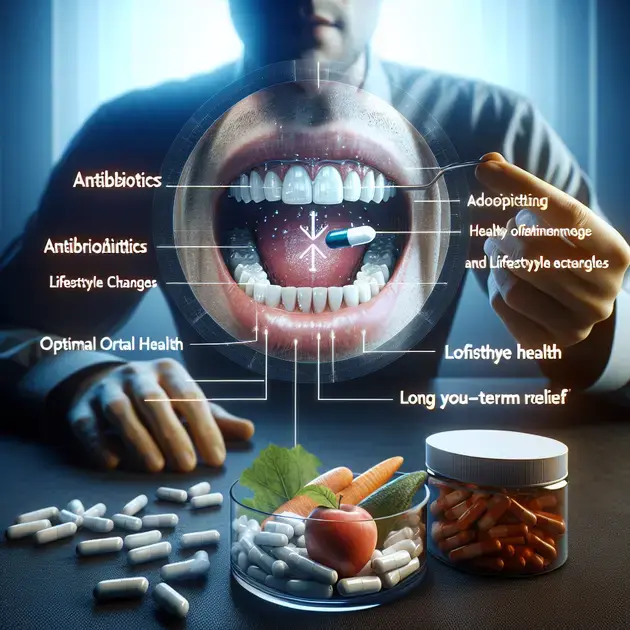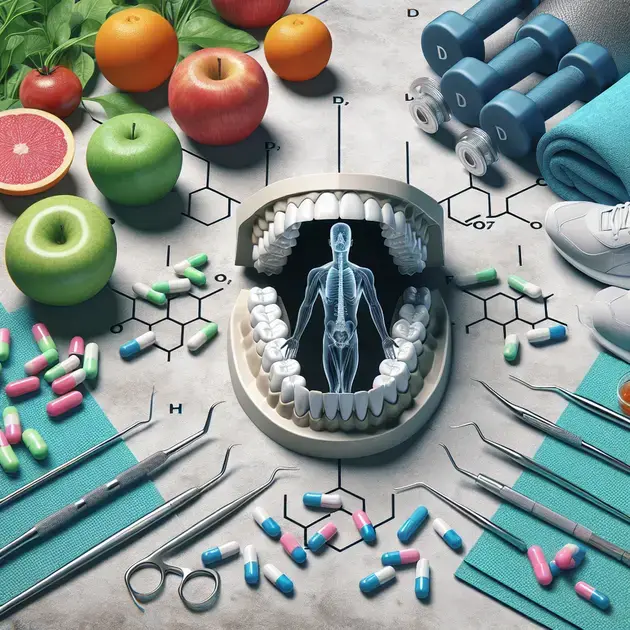When it comes to dealing with periodontitis, medication plays a crucial role in the treatment process. Understanding how these medications work and what to expect is essential for managing this condition effectively.
Recent studies have shown that certain medications, such as antibiotics and antiseptic mouthwashes, can be effective in controlling the progression of periodontitis. Learning about the different types of medication available and their potential side effects can help patients make informed decisions about their treatment plans.

Understanding Periodontitis Medication
Periodontitis is a common condition that affects the gums and bone supporting the teeth, leading to inflammation and potential tooth loss if left untreated. Understanding the medication options available for periodontitis is crucial in managing the disease effectively. Here are some key points to consider:
1. Talk to Your Dentist or Periodontist
The first step in understanding periodontitis medication is to consult with your dentist or periodontist. They will evaluate the severity of your condition and recommend suitable treatment options, which may include medication.
2. Research Different Medications
There are several types of medications used to treat periodontitis, such as antibiotics, antimicrobial mouth rinses, and enzymes to break down plaque. Researching these options and their benefits can help you make informed decisions about your treatment plan.
3. Review Possible Side Effects
Before starting any medication for periodontitis, it’s essential to review the possible side effects. Some medications may cause irritation or allergic reactions, so it’s crucial to be aware of these risks before proceeding with treatment.
4. Follow Your Prescribed Treatment Plan
Once you have a clear understanding of the medication prescribed for your periodontitis, make sure to follow your treatment plan diligently. This includes taking medication as directed, attending follow-up appointments, and maintaining good oral hygiene practices.
5. Monitor Your Progress
Regularly monitor your progress while taking periodontitis medication. Note any changes in your symptoms, side effects, or overall oral health. If you have any concerns or questions, don’t hesitate to discuss them with your dental professional.
Types of Medication for Periodontitis
There are several types of medication used to treat periodontitis, each serving a specific purpose in managing the condition. Understanding the different options available can help you make informed decisions about your treatment. Here are some common types of medication for periodontitis:
1. Antibiotics
Antibiotics are often prescribed to combat bacterial infections associated with periodontitis. These medications may be taken orally or applied directly to the affected area to help reduce inflammation and promote healing.
2. Antimicrobial Mouth Rinses
Antimicrobial mouth rinses contain active ingredients that target and kill harmful bacteria in the mouth. Using these rinses as part of your daily oral hygiene routine can help reduce plaque buildup and prevent further progression of periodontitis.
3. Enzymes
Enzymes such as collagenase are sometimes used to break down and remove plaque and tartar buildup on the teeth and gums. These medications can aid in the restoration of gum tissue and support overall oral health.
4. Pain Relief Medications
In cases where periodontitis causes discomfort or pain, your dentist may prescribe pain relief medications to help manage symptoms. These medications can provide temporary relief while addressing the underlying cause of the condition.
5. Anti-Inflammatory Drugs
Anti-inflammatory drugs may be recommended to reduce swelling and inflammation associated with periodontitis. These medications can help alleviate discomfort and promote healing in the affected gums and bone.
Managing Side Effects of Periodontitis Medication
While periodontitis medication is essential for managing the condition, it can sometimes lead to unwanted side effects. Here are some tips for managing and minimizing side effects associated with periodontitis medication:
1. Stay Hydrated
Drinking plenty of water can help flush out any medication toxins from your system and reduce the likelihood of experiencing side effects like dry mouth or gastrointestinal issues.
2. Follow Dosage Instructions
Adhering to the prescribed dosage of your medication is crucial in minimizing side effects. Avoid taking more than the recommended amount, as it can increase the risk of adverse reactions.
3. Monitor Your Symptoms
Keep track of any side effects you experience while taking periodontitis medication. If you notice any concerning symptoms, such as rash, swelling, or difficulty breathing, contact your healthcare provider immediately.
4. Communicate with Your Healthcare Provider
If you are experiencing troublesome side effects from your periodontitis medication, don’t hesitate to reach out to your healthcare provider. They may be able to adjust your dosage or recommend alternative medications to alleviate your symptoms.
5. Practice Good Oral Hygiene
Maintaining good oral hygiene practices, such as brushing and flossing regularly, can help prevent side effects like oral thrush or gum irritation. Be sure to follow your dentist’s recommendations for oral care while taking medication for periodontitis.

**The Advantages of Antibiotics in Periodontitis Treatment**
Introduction
Periodontitis is a severe gum infection that can lead to tooth loss. Antibiotics are a common treatment approach used in conjunction with other therapies to combat the bacteria causing the infection. In this article, we will explore the advantages that antibiotics offer in the treatment of periodontitis.
Benefits of Antibiotics
Antibiotics work by killing or inhibiting the growth of bacteria, which can help reduce inflammation and prevent the progression of periodontitis. They can reach areas that are difficult to clean through regular oral hygiene practices, making them an effective addition to the treatment plan. In cases of advanced periodontitis, antibiotics can be crucial in controlling the infection and supporting the healing process.
Types of Antibiotics Used
Common antibiotics prescribed for periodontitis include tetracycline, doxycycline, and metronidazole. These medications can be taken orally or applied directly to the affected areas in the form of gels. Each type of antibiotic has its unique mechanism of action, allowing for a tailored approach to treatment based on the patient’s specific condition.
Combination Therapy
Combining antibiotics with other periodontal treatments, such as scaling and root planing, can enhance the overall effectiveness of the therapy. This combined approach targets the infection from multiple angles, leading to improved outcomes and long-term success in managing periodontitis. Patients may also experience faster relief from symptoms and a reduced risk of recurrence.
Patient Compliance
Adherence to the prescribed antibiotic regimen is essential for the success of the treatment. Patients should follow their dentist’s instructions carefully and complete the full course of antibiotics to ensure that the infection is fully eradicated. Regular follow-up appointments are necessary to monitor progress and make any necessary adjustments to the treatment plan.
**Importance of Integrating Medication and Lifestyle Changes**
Introduction
Medication plays a crucial role in treating periodontitis, but it must be accompanied by lifestyle changes to achieve optimal results. In this section, we will discuss the importance of integrating medication with lifestyle modifications in the management of periodontitis.
Addressing Underlying Factors
Periodontitis is often linked to lifestyle habits such as smoking, poor nutrition, and inadequate oral hygiene. Medication can help control the infection, but without addressing these underlying factors, the risk of recurrence remains high. By incorporating healthy habits into their daily routine, patients can support the effectiveness of the medication and improve their overall oral health.
Supporting Healing and Recovery
Lifestyle changes such as quitting smoking, adopting a balanced diet, and practicing good oral hygiene can accelerate the healing process and enhance the effects of medication. Smoking, for example, can reduce blood flow to the gums, impairing the body’s ability to fight infection. Making positive changes can promote tissue repair and reduce inflammation, leading to better outcomes in periodontitis treatment.
Promoting Long-Term Oral Health
Integrating medication with lifestyle modifications can have long-lasting benefits for oral health. By taking a holistic approach to treatment, patients can not only manage the current infection but also prevent future oral health issues. Maintaining a healthy lifestyle can strengthen the immune system, making it more resilient against bacterial infections and contributing to overall well-being.
Educating Patients
Dentists play a crucial role in educating patients about the importance of lifestyle changes in conjunction with medication for managing periodontitis. By providing guidance and support, dentists can empower patients to take control of their oral health and make informed decisions about their treatment plan. Open communication and collaboration between the dental team and patients are essential for successful outcomes.
**Maximizing Periodontitis Relief Through Combined Approach**
Introduction
Periodontitis relief can be maximized by adopting a combined approach that integrates various treatment modalities. In this segment, we will explore how combining different therapies can enhance the effectiveness of periodontitis treatment and provide long-term relief for patients.
Comprehensive Treatment Plan
A combined approach to periodontitis treatment involves creating a comprehensive plan that addresses the specific needs of each patient. This may include a combination of antibiotics, scaling and root planing, surgical interventions, and lifestyle modifications. By customizing the treatment plan, dentists can target the infection from multiple angles and promote optimal healing.
Enhanced Healing Process
Combining antibiotics with other therapies can accelerate the healing process and reduce the severity of symptoms associated with periodontitis. Antibiotics help control the bacterial infection, while procedures like scaling and root planing remove plaque and calculus from the teeth and gums. This synergistic effect can lead to faster relief and improved periodontal health.
Preventing Recurrence
By combining different treatment modalities, dentists can help prevent the recurrence of periodontitis in patients. Antibiotics can suppress the growth of bacteria, while regular dental cleanings and ongoing maintenance can keep the gums healthy and free from infection. Education on proper oral hygiene practices and lifestyle habits further reduces the risk of relapse.
Optimizing Long-Term Outcomes
A combined approach to periodontitis treatment not only provides immediate relief but also sets the foundation for long-term oral health. Patients who follow a comprehensive treatment plan are more likely to experience sustained improvements in their gum health and overall well-being. By prioritizing a holistic approach, dentists can help patients achieve lasting periodontitis relief.
Conclusion
In conclusion, antibiotics play a crucial role in the effective treatment of periodontitis by targeting and controlling the bacterial infection that causes gum disease. The benefits of antibiotics, such as reducing inflammation, preventing disease progression, and reaching inaccessible areas for thorough cleaning, make them a valuable addition to periodontal therapy. Understanding the types of antibiotics used and their unique mechanisms of action allows for tailored treatment plans based on individual patient needs.
Moreover, integrating medication with lifestyle changes is paramount in managing periodontitis successfully. By addressing underlying factors like smoking, poor nutrition, and inadequate oral hygiene, patients can enhance the overall effectiveness of medication, accelerate the healing process, and promote long-term oral health. Educating patients about the significance of combining medication with healthy habits empowers them to take control of their oral health and make informed decisions about their treatment.
By adopting a combined approach that incorporates various treatment modalities, periodontitis relief can be maximized. A comprehensive treatment plan that includes antibiotics, scaling and root planing, surgical interventions, and lifestyle modifications targets the infection from multiple angles, leading to optimal healing and long-term outcomes. This holistic approach not only provides immediate relief but also aids in preventing disease recurrence and ensuring sustained improvements in gum health and overall well-being.



